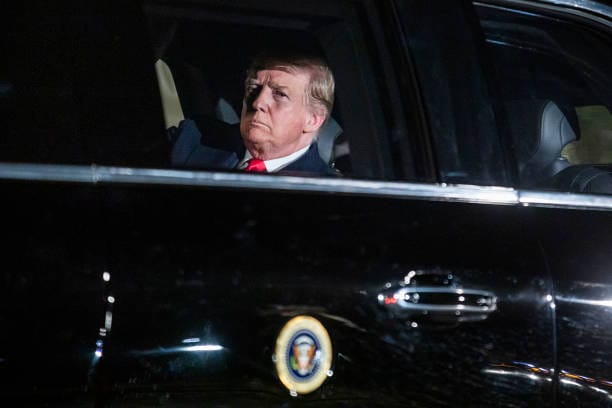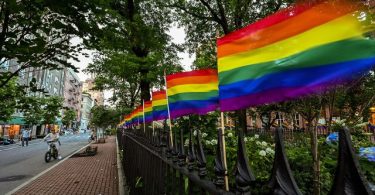GLAAD has documented the anti-LGBTQ history of Donald Trump, including his efforts to restrict the voting rights of people of color and other marginalized groups before and during his presidency. Trump’s full anti-LGBTQ record is available on GLAAD’s Trump Accountability Tracker. The right to vote is a cornerstone of American democracy, and attempts to withhold this fundamental right from some Americans based on race, class, sexual orientation, or gender identity should be a concern for all Americans. Trump’s record on voting rights includes the below.
2021—In his first public speech after his November 3, 2020, election loss to Joe Biden, Trump laid out a variety of election proposals, such as limiting absentee voting and days when Americans can vote. He also proposed eliminating mail-in voting, another factor in his loss, as well as requiring voters to show identification when they vote in person and universal signature matching for those who vote by absentee ballot.
2020—The NAACP sued Trump, his presidential campaign, and the Republican National Committee (RNC) in the U.S. District Court for the District of Columbia for systematically trying to disenfranchise Black voters in states across the country. The lawsuit alleged that President Trump, the Trump campaign, and the RNC have engaged in a coordinated conspiracy to disenfranchise Black voters by disrupting vote-counting efforts, lodging groundless challenges during recounts, and attempting to block certification of election results through intimidation and coercion of election officials and volunteers.
2020—Trump falsely claimed that voting-by-mail is “corrupt” and “dangerous,” even while states embraced it as a safe alternative during the COVID-19 pandemic. “Mail ballots are a very dangerous thing for this country because they’re cheaters. They go and collect them. They’re fraudulent in many cases,” Trump said.
2020—Trump voted absentee, despite criticizing absentee voting. He chose to vote by mail rather than in-person even though his motorcade repeatedly drove right by an early voting site at a Palm Beach County library around the date of the March 2020 election.
2020—Ruby Freeman and her daughter, Wandrea “Shaye” Moss, both former election workers from Fulton County, Georgia, faced threats of violence after allegations from a Trump-backed conspiracy theory in the aftermath of the 2020 election were found to be “false and unsubstantiated.”
2019—Trump floated the idea of extending his constitutionally limited time in office, complaining online that two years of his first White House term were “stolen” as a result of special counsel Robert Mueller’s investigation.
2019—Trump’s Department of Justice settled a voting rights lawsuit with the City of Eastpointe, Michigan, filed in 2017. The Department’s complaint alleges the current method of election for the Eastpointe City Council results in black citizens in Eastpointe having less opportunity than white citizens to participate in the political process and to elect candidates of their choice to the city council, in violation of Section 2 of the Voting Rights Act.
2019—Trump tweeted: “With Universal Mail-In Voting (not Absentee Voting, which is good), 2020 will be the most INACCURATE & FRAUDULENT Election in history…. It will be a great embarrassment to the USA. Delay the Election until people can properly, securely and safely vote???”
2019—Trump’s Department of Justice reversed a 2013 decision that argued Texas should be put under federal supervision after being found to have intentionally discriminated against voters during redistricting so that it wouldn’t do it again.
2019—NAACP releases “President Trump’s Judicial Playbook: Weaponizing the Bench to Suppress The Vote,” a report blasting Trump’s judicial appointments as a “central feature of the Administration’s assault on voting rights.”
2018—Trump established then dissolved a voter fraud commission, which he attributed to various states’ refusal to participate in the board, which was criticized as a misguided step to solve a practically non-existent problem.
2017—Trump’s Department of Justice reversed its position in a high-profile voting case in Ohio, siding with the state in its effort to purge thousands of people from its rolls for not voting in recent elections.
2017—Weeks after Trump took office, the Department of Justice announced it was ending a longstanding legal claim that Texas’ voter ID law—one of the strictest in the country at the time—was passed with discriminatory intent.
GLAAD’s Voter Poll shows:
LGBTQ registered voters are highly motivated as the presidential and key congressional campaigns approach, with 94% indicating they are definitely (83%) or probably (11%) voting this November.
72% experience negative impacts to their mental health and emotional well-being caused by the current state of political discourse in our country.
Donald Trump Elections 2024 Fact Sheets Florida Georgia Media Resources Michigan Ohio Texas Voting Rights Washington DC
Share.
LinkedIn
WhatsApp
Reddit
Email
Tumblr







